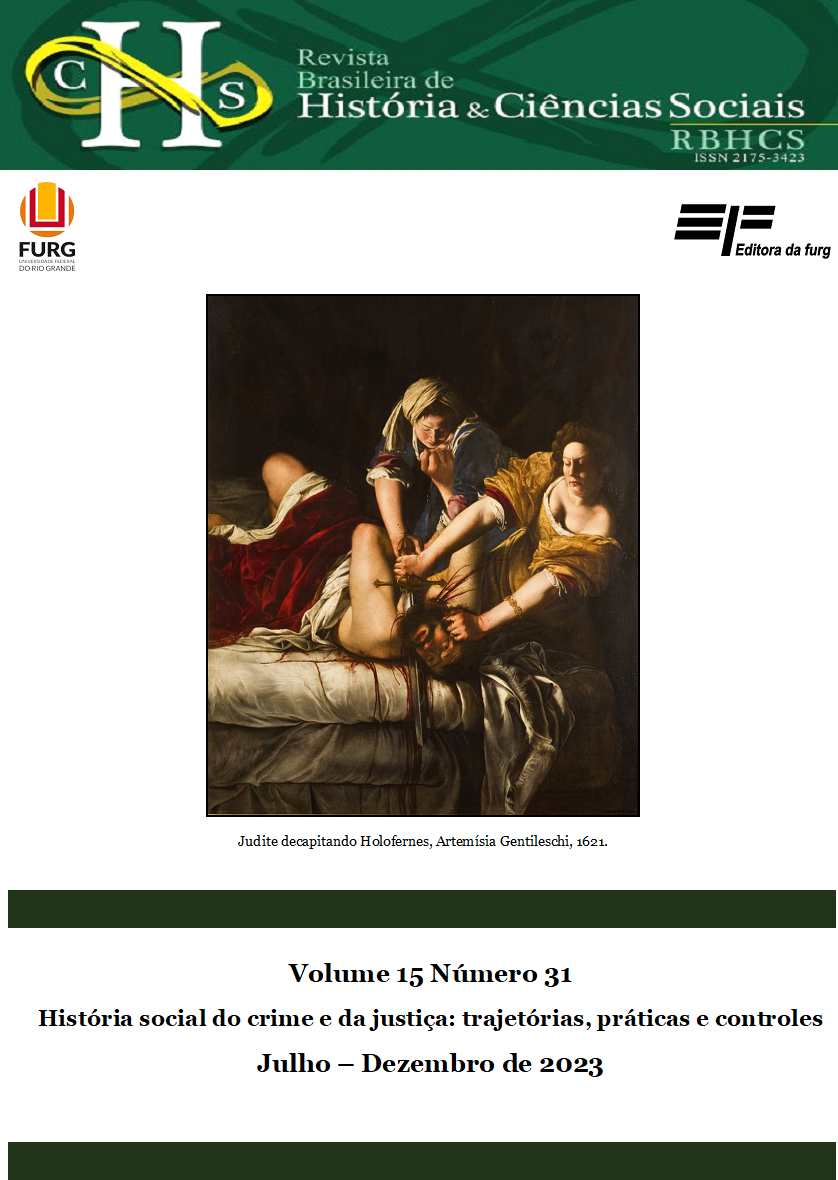Trajetórias judiciais e suas representações históricas no Império Romano: Tibério César e o julgamento de Clutório Prisco (21 d.C).
DOI:
https://doi.org/10.14295/rbhcs.v15i31.15858Keywords:
Representação Histórica, Literatura Judicial, Império RomanoAbstract
Literary representations of trials are fundamental for an in-depth understanding of the socio-political reality of the early Roman Empire and the narrative structures used in the image construction of historical figures of the period. The judicial trajectories offer a variety of historiographical representations and interpretations incorporated into a vast image repertoire in which historical accuracy was not the main interest, but the decorum and verisimilitude in front of the literary tradition expectations. Against this background, this paper analyses the ancient narratives about the trial of Clutorius Priscus (21 AD) and how their rhetorical elements influenced the construction of the historical images of Emperor Tiberius Caesar (14 AD - 37 AD) and the justice administration during his reign.
Downloads
References
BASTOS MARQUES, Juliana. A historia magistra vitae e o pós-modernismo. História da Historiografia: International Journal of Theory and History of Historiography, Ouro Preto, v. 6, n. 12, p. 63–78, 2013. DOI: 10.15848/hh.v0i12.618. Disponível em: https://www.historiadahistoriografia.com.br/revista/article/view/618. Acesso em: 12 jun. 2023. DOI: https://doi.org/10.15848/hh.v0i12.618
BAUMAN, Richard A. Crime and Punishment in Ancient Rome. London: Routledge, 1996.
__________________. Impietas in principem: a study of treason against the Roman emperor with special reference to the first century A.D. München: Beck, 1974.
BELCHIOR, Ygor. K. Iam victum fama non visi Caesaris agmen (Luc. Phars. 2, 600): os boatos nas guerras civis entre Pompeu e César (54-48 a.C.). 2018. Tese (Doutorado em História Social) - Faculdade de Filosofia, Letras e Ciências Humanas, Universidade de São Paulo, São Paulo, 2018. doi:10.11606/T.8.2018.tde-30102018-161156. Acesso em: 2023-06-12. DOI: https://doi.org/10.11606/T.8.2018.tde-30102018-161156
BOSWORTH, A B. Plus ça change.... Ancient Historians and their Sources. Classical Antiquity. vol. 22, Nº 2, pp. 167–198, 2003. DOI: https://doi.org/10.1525/ca.2003.22.2.167
CANFORA, Luciano. Storici e storia. Turin: Aragno, 2003.
COELHO, Ana Lúcia dos S. As Metamorfoses de Nero: um estudo da construção da tradição literária sobre o último Júlio-Cláudio e o seu Principado (I-III d.C.). 2021. 403 f. Tese (Doutorado em História) - Instituto de Ciências Humanas e Sociais, Universidade Federal de Ouro Preto, Mariana, 2021.
COSTA CAMPOS, Rafael da. Entre Roma e Capri: o afastamento de Tibério César como ponto de inflexão políticia durante seu Principado (14-37 d.C). 2013. Tese (Doutorado em História Social) - Faculdade de Filosofia, Letras e Ciências Humanas, Universidade de São Paulo, São Paulo, 2013.
COWAN, Eleanor. Tacitus, Tiberius and Augustus. Classical Antiquity, vol. 28, nº 2: pp. 179–210. 2009. DOI: 10.1525/CA.2009.28.2.1792009. DOI: https://doi.org/10.1525/CA.2009.28.2.179
______________. Contesting Clementia: the Rhetoric of Severitas in Tiberian Rome before and after the Trial of Clutorius Priscus. The Journal of Roman Studies, vol. 106: pp. 77-101. 2016. DOI: https://doi.org/10.1017/S0075435816000605
DAMON, Cynthia. Constructing a Narrative. In: D. S. Potter. A Companion to the Roman Empire. Blackwell Companions to the Ancient Eorld. Oxford: Blackwell Pub, 2006. DOI: https://doi.org/10.1002/9780470996942.ch2
FAVERSANI. Fábio; JOLY. Fábio. D. Alexandre em Quinto Cúrcio e o Principado Romano: um estudo de Allelopoiesis. Revista Phônix, vol. 27, nº 2: pp. 97-110. 2021. DOI: https://doi.org/10.26770/phoinix.v27n2a5
FAVERSANI, Fábio. Entre a República e o Império: apontamentos sobre a amplitude desta fronteira. Mare Nostrum. Estudos sobre o Mediterrâneo Antigo, v. 4: pp. 100-111, 2013. DOI: https://doi.org/10.11606/issn.2177-4218.v4i4p132-138
__________________. Tirano, louco e incendiário: BolsoNero. Análise da constituição da assimilação entre o Presidente da República do Brasil e o Imperador Romano como allelopoiesis. História da Historiografia: International Journal of Theory and History of Historiography: Ouro Preto, v. 13, n. 33, p. 375–395, 2020. DOI: 10.15848/hh.v13i33.1573. Disponível em: https://www.historiadahistoriografia.com.br/revista/article/view/1573. Acesso em: 12 jun. 2023. DOI: https://doi.org/10.15848/hh.v13i33.1573
GONÇALVES, Ana Teresa. Imagem, poder e amizade: Dião Cássio e o debate Agripa-Mecenas. In: Fábio D. Joly (org.). História e retórica: ensaios sobre historiografia. Editora Alameda: São Paulo, 2007.
GOWING, Alan M. From the annalists to the Annales: Latin historiography before Tacitus. In: A. J. Woodman (org.). The Cambridge Companion to Tacitus. Cambridge: Cambridge University Press, 2009. DOI: https://doi.org/10.1017/CCOL9780521874601.002
JOLY, Fábio D. Tácito e a Metáfora da Escravidão: um Estudo de Cultura Política Romana. São Paulo: EDUSP, 2004.
KER, James. Roman Repraesentatio. The American Journal of Philology, vol. 128, nº 3: pp. 341-365, 2007. DOI: https://doi.org/10.1353/ajp.2007.0037
KOSELLECK, Reinhart. Futuro Passado: contribuição à semântica dos tempos históricos. Rio de Janeiro: Contraponto/Editora PUC-Rio, 2006.
LANGLANDS, Rebecca. Exemplary Ethics in Ancient Rome, Cambridge, UK: Cambridge University Press, 2018. DOI: https://doi.org/10.1017/9781139629164
_____________________. Roman exempla and situation ethics: Valerius Maximus and Cicero de Officiis. The Journal of Roman Studies, v. 101: pp. 100–122, 2011. DOI: https://doi.org/10.1017/S0075435811000116
LANNA DE FREITAS, João V. O crimen maiestatis e o Principado Romano (27 A.C – 68 D.C): conflito, competição e representação. 2021. 414 f. Tese (Doutorado em História) - Instituto de Ciências Humanas e Sociais, Universidade Federal de Ouro Preto, Mariana, 2021.
LEÃO, Delfim. Matéria Religiosa: processo de impiedade (asebeia). In: D. F. Leão, L. Rossetti e M. do Céu Fialho (eds.). Nomos: Direito e sociedade na Antiguidade Clássica/Derecho y sociedad en la Antigüedad Clásica. Coimbra e Madrid: Imprensa da Universidade de Coimbra e Ediciones Clásicas, 2004, pp. 201-226. DOI: https://doi.org/10.14195/978-989-26-0903-4_13
LEVICK, Barbara M. Mercy and Moderation on the Coinage of Tiberius. In: B. M. Levick (ed.). The Ancient Historian and His Materials: Essays in Honour of C. E. Stevens, pp. 123–137. Farnborough: England, 1975.
_________________. Tiberius: the politician. London/NY: Routledge, 1999.
MADSEN. John M. Criticising the Benefactors: The Severans and the Return of Dynastic Rule. In: C. H. Lange; J. M. Madsen (eds.). Cassius Dio: Greek Intellectual and Roman Politician. Historiography of Rome and its Empire, vol. 1, Leiden/Boston: Brill, pp. 136-158. 2016. DOI: https://doi.org/10.1163/9789004335318_009
MALLAN, Christopher. T. A Historical and Historiographical Commentary on Cassius Dio's "Roman History" Book 57.1-17.8. Philosophy Doctorate Thesis. Wadham College Trinity, 2015.
___________________. The Style, Method, and Programme of Xiphilinus’ Epitome of Cassius Dio’s Roman History. Greek, Roman, and Byzantine Studies, vol. 53: pp. 610–644, 2013.
MARINCOLA, John. Authority and tradition in ancient historiography. Cambridge/New York: Cambridge University Press, 1997. DOI: https://doi.org/10.1017/CBO9780511584831
__________________. Speechs in Classical Historiography. In: J. Marincola (ed.). A Companion to Greek and Roman Historiography. Oxford: Blackwell, pp. 118-132. 2007.
MARTINS, Caroline M. Modelos éticos femininos na Roma Antiga: uma análise sobre a construção da fama de Lívia Drusila e Agripina Maior. Outros Tempos, v. 17, p. 83-99, 2020. DOI: https://doi.org/10.18817/ot.v17i29.754
MARTINS, Paulo. Breve história da crítica da Literatura Latina. São Paulo: Classica: Revista Brasileira de Estudos Clássicos, vol. 21.2, 189-204, 2008. DOI: https://doi.org/10.14195/2176-6436_21-2_2
______________. Imagem e Poder: Considerações sobre a representação de Otávio Augusto (44 a.C. - 14 d.C.). São Paulo: Editora EDUSP, 2011.
MILLAR, Fergus. A Study of Cassius Dio. Oxford: Oxford University Press, 1964.
______________. Tiberius Speaks. Ancient Journal of Philology, vol. 89: pp. 1–19, 1968.
MOMIGLIANO, Arnaldo. As raízes clássicas da historiografia moderna. Bauru: Edusc, 2004.
NICOLAI, R. The Place of History in the Ancient World. In: J. Marincola (ed.). A Companion to Greek and Roman Historiography. Oxford: Blackwell, pp. 13-26. 2011.
PETRINI, Francesco M. Considerazioni su C. Prisco e il suo processo (Tac. ann. III 49––51, Cass. Dio LVII 20,3––4). KLIO, vol. 90: pp. 76-104, 2008. DOI: https://doi.org/10.1524/klio.2008.0005
RICOEUR, Paul. A memória, a história e o esquecimento. Campinas, SP: Editora da Unicamp, 2007.
ROGERS, Robert S. Criminal Trials, and Criminal Legislation under Tiberius. Middletown, CT: American Philological Association, 1935.
RUTLEDGE, Steven. Imperial Inquisitions. London: Routledge, 2001. DOI: https://doi.org/10.4324/9780203186084
SEAGER, Robin. Tiberius. Oxford: Wiley-Blackwell, 2005. DOI: https://doi.org/10.1002/9780470773871
SHOTTER, David. The Trial of Clutorius Priscus. Greece & Rome, vol. 16: pp. 14-18, 1969. DOI: https://doi.org/10.1017/S0017383500016260
SMITH. R. E. The Law of libel at Rome. Classical Quarterly, vol. 1, nº 3-4: pp. 169 – 182, 1951. DOI: https://doi.org/10.1017/S0009838800004183
SYME, R. Tacitus. Oxford: Oxford University Press, 1997 (2 vols).
TALBERT, Richard J A. The Senate of Imperial Rome. Princeton: Princeton University Press, 1984. DOI: https://doi.org/10.1515/9781400849765
TUORI, Kaius. The Emperor of Law: the emergence of Roman Imperial Adjudication. Oxford Studies in Roman Society and Law. Oxford: Oxford University Press, 2016. DOI: https://doi.org/10.1093/acprof:oso/9780198744450.001.0001
WOODMAN, Anthony J. Rhetoric in Classical Historiography: Four Studies. London/New York: Routledge, 1988.
Downloads
Published
How to Cite
Issue
Section
License
Copyright (c) 2024 João Victor Lanna de Freitas

This work is licensed under a Creative Commons Attribution 4.0 International License.
Direitos Autorais
A submissão de originais para a Revista Brasileira de História & Ciências Sociais implica na transferência, pelos autores, dos direitos de publicação. Os direitos autorais para os artigos publicados nesta revista são do autor, com direitos da revista sobre a primeira publicação. Os autores somente poderão utilizar os mesmos resultados em outras publicações indicando claramente a Revista Brasileira de História & Ciências Sociais como o meio da publicação original.
Licença Creative Commons
Exceto onde especificado diferentemente, aplicam-se à matéria publicada neste periódico os termos de uma licença Creative Commons Atribuição 4.0 Internacional, que permite o uso irrestrito, a distribuição e a reprodução em qualquer meio desde que a publicação original seja corretamente citada.













